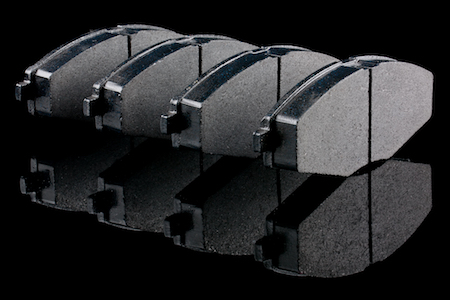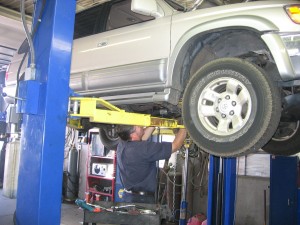What’s one of the most important systems on your vehicle? It would be hard not to put the brake system at the top of the list. Imagine sailing through congested areas, or trying to navigate a busy intersection without the use of brakes. It simply couldn’t happen.
Yet for all of its importance to how well your car works, most of us pay little attention to the braking system. We expect it to be there, working for us, every time we turn the key.
Like other parts, your brakes wear out over time – especially your brake pads. These are one of the most important pieces of your braking system.
How were brake pads invented?
When most of us think about the very first cars, we think of the horseless carriages we see rambling in old movie clips. They bumped and jumped along on dirt roads, never going very fast.
These original vehicles were created with brake systems made from wood. The driver pressed a lever that moved a block of wood against the wheel of the car. The friction from the action stopped the vehicle.
What worked at 10 to 20 mph didn’t work as cars picked up speed. Friction causes heat. And wood doesn’t do very well when you involve heat.
Today, one of the pioneers in modern braking systems is considered to be Gottlieb Daimler, who invented mechanical drum brakes. He theorized that by anchoring a cable-wrapped drum to a vehicle’s chassis, it could be used to stop the momentum of the car.
Daimler wasn’t the only one who had a hand in making our modern brake systems. William Lanchester patented the disc brake in 1902. Anti-lock brakes were invented by Gabriel Voisin in 1929. And the rest, as they say, is history.
How do modern brake pads work?
We’ve come a long way since those wooden blocks used as brake pads.
Today’s brake pads are created in several ways.
Years ago, brake pads were made from asbestos, because of its heat-absorbing material. Over time, as asbestos was called out for being a highly carcinogenic and cancer-causing material, manufacturers turned to organic brake pads to fill the void.
Organic brake pads are currently used on the majority of vehicles sold in the US. They are created using a mixture of fibers, including rubber, carbon compounds, glass, fiberglass, Kevlar, and more. They are bound together using resin, and provide good performance throughout the life of the product.
Of course, that’s not the only option. Another option is ceramic brake pads. These pads are ceramic-based, made from ceramic plates that look like modern-day pottery. They are denser but more durable, having fine copper fibers weaved throughout to increase strength and conductivity. They are quieter than organic brake pads, have a longer lifespan, and are considered to have more reliability in a greater amount of temperature variances. However, they are the most costly of all brake pads. Heat is transferred through the brake pads and into the rest of the braking system more easily, meaning you’ll see more wear and tear on other parts as well.
Metallic brake pads are made of iron, copper, steel, and graphite, mixed together and bonded to create the pad material. The reason these have stood the test of time is that they are durable, provide good performance, and are cost-effective. They can take the greatest heat variance, which makes them perfect for performance vehicles that tend to use the braking system more, and at higher speeds.
No matter what type of brake pad your vehicle uses, they stop your car in similar fashion. The brake pad makes contact with the rotors and causes friction to slow your car down to a stop.
When you press on the brake pedal, it sends brake fluid through a cylinder down into the calipers. The calipers engage the brake pads, and start applying pressure to the rotor attached to each wheel. This pressure creates the friction used to slow down your car. As the rotor slows, so does your wheel.
How do I know when my brakes have a problem?
If your brake system is working as it should, you probably don’t think much about it. But as your brake pads start wearing down, your car’s performance will change.
You might notice a screaming or grinding noise every time you press down on the brake pedal. This signals the brake pads are worn and aren’t connecting with the rotors the way they should. It’s your cue to bring in your vehicle as soon as possible.
You might notice shaking in your steering wheel or brake pedal. As worn out brake pads connect with the rotors, they can produce a shimmy or a shake. It’s your car’s way of telling you something is wrong.
You might notice a warning light. A dashboard light might illuminate telling you there’s a problem with your system. It could be brake pads, low brake fluid, or a parking brake that’s engaged. If you can’t find the cause, bring it to the shop for us to check everything out.
Is there a percentage when brakes are officially worn out?
Every vehicle is made under different guidelines. You can check with your owner’s manual to determine how often your brakes should be inspected. General guidelines suggest twice a year or approximately every 5,000 miles. Of course, you should always follow what the manufacturer recommends.
You’ll often hear that brake pads have worn by a certain percentage. Some mechanics will say you have a certain percentage of brake life remaining – a 40 percent brake life remaining.
It’s important to talk with your mechanic to understand what that means. Some vehicles can move down to 25 percent and not show any of the classic signs. Safety is always the key.
Have a question about your brake pads? We’re here to help. Give us a call today, we’re happy to perform a brake pad check and see how worn your brake system is.

